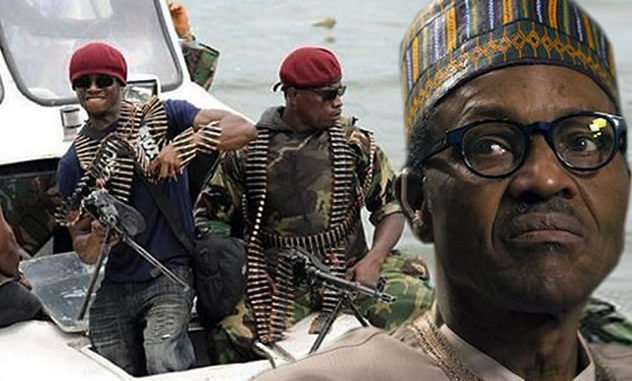
By Felix Onuah
ABUJA (Reuters) – Nigeria’s President Muhammadu Buhari on Tuesday met leaders from the Niger Delta and representatives of militant groups who have been attacking oil facilities in the region.
A Reuters reporter saw state governors and traditional rulers from the swamp lands meet Buhari and top security and army officials at the presidential villa in Abuja. A government official said militant groups had also sent representatives.
There was no immediate word on the outcome of the talks.
This is Buhari’s first meeting with Delta leaders since militants started a wave of attacks on oil pipelines earlier this year to get a greater share of oil revenues.
The attacks, which put four key export streams under force majeure, led production to plunge to just 1.37 million barrels per day in May, the lowest level since July 1988, according to the International Energy Agency (IEA), from 2.2 million barrels in January 2016.
Nigeria has held talks for months to end the violence but no lasting ceasefire has been agreed in the oil hub where many complain about poverty, even though the region provides much of Nigeria’s oil exports.
OPEC member Nigeria agreed on a ceasefire with major militant groups in 2009 to end an earlier insurgency. But previously unknown groups have since taken up arms after authorities tried to arrest a former militant leader on corruption charges.
Under a 2009 amnesty, fighters who lay down their arms receive training and employment. However, of the
$300 million annual funding set aside for this, much ends up in the pockets of “generals” or officials, analysts say – an endemic problem in a country famous for graft.
Any ceasefire would be difficult to enforce as the militants are splintered into small groups of angry, young unemployed men even their leaders struggle to control.
A major group, the Niger Delta Avengers, had initially declared a ceasefire in August but then claimed another attack last month.
The group has threatened to step up attacks on oil facilities in the Niger Delta if the president pursues a military campaign, its spokesman Mudoch Agbinibo told Reuters in written responses to questions.
(Reporting by Felix Onuah; writing by Ulf Laessing; editing by Jason Neely and Alexandra Hudson)